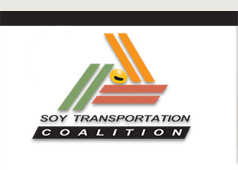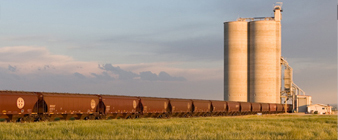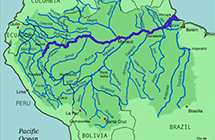 |
 |
|
| eNews • August 2019 | ||
| Promoting a Cost-Effective, Reliable and Competitive Transportation System |
||
 Brazil's Soybean Lead Over the U.S. Gets Boost From Amazon Ports
Brazil's Soybean Lead Over the U.S. Gets Boost From Amazon Ports
Brazil, the biggest soybean exporter, is strengthening its lead against the U.S. after trading giants spent billions of dollars on building new terminals and developing routes to ports in the north through the Amazon region.
"Brazil's northern ports are allowing the country to export big volumes of grain without the historical loading delays or vessel queues," said Sergio Mendes, general director at the grain-export group Anec. "Traders are shipping through the north the same soybean volumes they usually export from Santos, Latin America's largest port," in the south, he said. "This is a huge conquest."
Bunge Ltd. kicked off the expansion in 2014 by using vessels on an Amazon waterway to move soybeans 1,000 kilometers (621 miles) to Barcarena port in Para state from Mato Grosso, the top producing state. Companies including Cargill Inc. and Louis Dreyfus Co. made investments to construct terminals and barge fleets. Railway operations have improved, and road administration shifted to private firms from the government, aiding logistics, said Daniel Furlan, economics manager at Abiove in Sao Paulo.
Corn shipments this year may climb 58% to 38 million metric tons, and soybean exports may be 70.5 million, topping a previous estimate by 5.2%, partly because of transportation and port expansions, Andre Pessoa, head of Agroconsult, has forecast. In the first half, a combined 19 million of corn and soybean products moved from the north, and the 2019 volume may reach 35 million, according to farm group Aprosoja.
From January through June 2019, soybean shipments from southern ports rose 16% from the same period in 2014, while exports from northern ports more than tripled, according to government data compiled by the industry group Abiove. In the six months ended June, the north handled 32% of total shipments, more than doubling from 2014.
"Both rising export capacity and improving access to the new terminals allow the sustainable export growth through the north," said Edeon Vaz Ferreira, head of the logistic branch at Aprosoja.
More investments should come. Cargill may invest 900 million reais ($240 million) through 2030 in a new private terminal in Abaetetuba, Para state, adding as much as 9 million tons to the existing export capacity of 9.5 million tons in northern Brazil, a "strategic region" for grain shipments, the company said by email.
While the Amazon shortcut reduced travel time from fields to ports, the cost of moving crops to northern ports is equivalent to transportation expenses to southern terminals, partly because of unpaved roads, Ferreira said.
To smooth out the logistics, trading companies plan to build a railway to ship grain from Mato Grosso to the Miritituba river depot for barges heading for export terminals. The government is reviewing the concession plan and auction of the so-called Ferrograo with no deadline set.
Brazil has benefited from infrastructure investments at a time when U.S. farmers have been rattled by the Trump administration's trade war with China, the top soybean importer. The Asian country has mostly shunned U.S. supplies, and shipments notably have slumped from ports in the Pacific Northwest, which has significant excess capacity for crops.
Photo Credit: Wikipedia
Source: Bloomberg L.P.
Soy Transportation Coalition |
|
